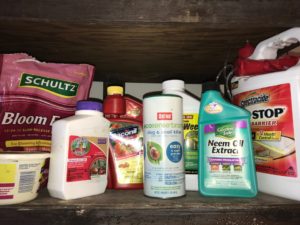As the month of March draws to a close, many home gardeners and green industry professionals are starting to prepare for the next growing season. While many concentrate on new planting ideas and gathering new supplies, it is important to use this time to think about what to do with some of the materials left over from previous gardening years. Although pots can be washed and sterilized, and soil and fertilizer can be used from year to year, some pesticides begin to lose their effectiveness after one or two seasons. This problem is can be made worse if products are kept in outdoor sheds that heat up in the summer and freeze in the winter.
Simply leaving the old containers of pesticides will not make the disposal problem go away. Older products can sometime rot the container and create an even larger mess when they spill into your storage area. DUMPING your concentrated pesticides in the soil, down the drain, or in the landfill during regular trash collection is both DANGEROUS TO THE ENVIRONMENT AND ILLEGAL.
So, now would be a good time to make some room in your storage area by collecting any pesticide that is more than two years old and taking them to your local solid waste management facility. Indiana is fortunate to have a statewide network of solid waste management districts.
The Indiana Department of Environmental Management maintains a directory of facilities that process the household wastes of residents in every county. https://www.in.gov/idem/recycle/files/hhw_collection_directory.pdf Although these facilities do not process business wastes free of charge, they can be a great resource for helping you find a facility to safely dispose of old pesticides.
The Office of the Indiana State Chemist participates an annual “Clean Sweep” program that provides guidance and resources about when and where to dispose of pesticides. http://www.oisc.purdue.edu/pesticide/clean_sweep.html
The following guidelines offered by Ed White of the Office of the Indiana State Chemist can help you avoid pesticide disposal problems in the first place:
- Only purchase as much product as you can reasonably use in one or two seasons
- Read the label carefully to determine how much pesticide product is required to treat your intended target area. There is no point in buying a GALLON jug of product if you only need TWO TABLESPOONFUL to treat the front and back of your property.
- Read carefully the STORAGE and DISPOSAL section of the label when you are done with the product for the season or want to get rid of EMPTY PESTICIDE CONTAINERS. Some products may specify KEEP FROM FREEZING on their labels. Such products don’t store well in an unheated garage or shed. Once chilled or frozen, the active ingredient may fall out of solution and form a solid layer on the bottom of the container. After this happens, the solid layer of active ingredient usually WILL NOT go back into solution.
- Dry, granular formulations such as combination weed and feed products often do not “overwinter” well in a shed or garage. The products will often absorb moisture from the atmosphere and set up into a hardened mass or lump that won’t work in your lawn spreader next spring/summer. If you must store weed & feed products over winter, consider overpacking the original bag/package with a double layer of plastic trash bags to try to exclude moisture.
For more information on safe pesticide use for homeowners see the link to this bulletin.
https://ppp.purdue.edu/wp-content/uploads/2016/08/PPP-109.pdf
